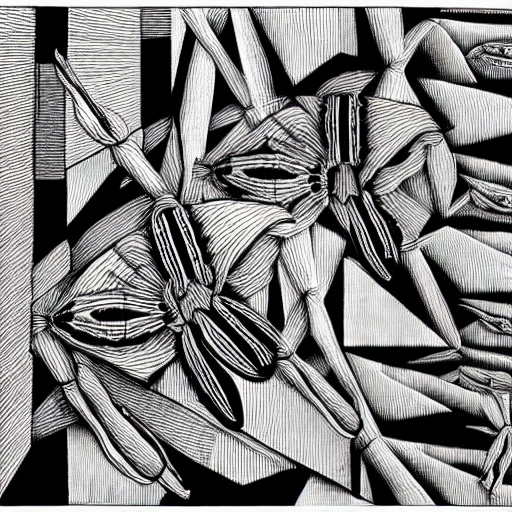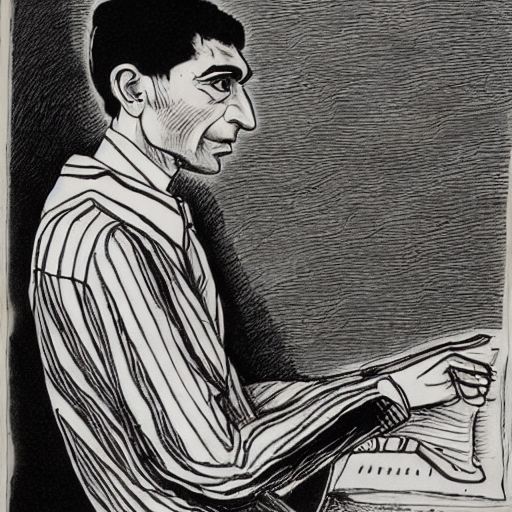Why Franz Kafka is Not a Surrealist: Examining the Distinctiveness of Kafka’s Writing Style
Franz Kafka is one of the most iconic and enigmatic writers of the 20th century. Known for his distinctive style, Kafka’s works are often categorized as surrealism, a movement that emphasizes the irrational and the imaginative. However, upon closer examination, it becomes clear that Kafka’s writing cannot be easily classified as surrealism. In fact, Kafka’s writing style transcends the boundaries of any particular literary movement, making it difficult to pin down. In this essay, we will explore the distinctiveness of Kafka’s writing style and why it cannot be reduced to a mere example of surrealism. By analyzing specific aspects of his writing, we will examine why Kafka’s works continue to captivate readers and inspire new interpretations.
Precise Language: A Stark Realism that Strips Away the Fantastical
Kafka’s use of language is one of the most notable aspects of his writing style. He employs a precise, straightforward language that reflects the stark realism of his works. Unlike many surrealists who employ metaphorical and symbolic language, Kafka uses language that is grounded in the everyday struggles of life. This approach to language gives his works a sense of immediacy and realism that is not found in surrealism.
For instance, in “The Metamorphosis,” Kafka uses clear and direct language to describe Gregor Samsa’s transformation into an insect. He eschews flowery language and metaphors, instead opting for a literal and unembellished style. This approach serves to underscore the sense of horror and absurdity of the situation, giving it a greater impact on the reader.

Mundane Struggles: The Lack of Dream-Like Qualities in Kafka’s Works
Kafka’s works often deal with the mundane struggles of life. He explores themes such as bureaucracy, work, and family relationships, imbuing them with a sense of existential dread. In contrast to surrealists who seek to subvert reality, Kafka’s writing centers around the ordinary, giving it a sense of realism that is not found in surrealism. This is evident in his most famous works, such as “The Trial,” which centers around the struggles of a man caught up in a mysterious and oppressive legal system.
This focus on the mundane also serves to underscore the sense of absurdity and meaninglessness that permeates Kafka’s works. He highlights the struggles and frustrations that all people face, lending his works a universal appeal. Rather than being limited to a particular time or place, Kafka’s works speak to the human condition and the existential crises that confront us all.
Crafting a Narrative: Kafka’s Unique Approach to Storytelling
Kafka was a master storyteller who crafted his narratives with meticulous attention to detail. He often builds tension and suspense, leaving his readers with more questions than answers. This approach to storytelling has led to countless interpretations of his works, with readers left to ponder the deeper meanings behind his often ambiguous stories.
In “The Trial,” for example, Kafka carefully constructs the narrative to convey a sense of oppression and disorientation. He introduces a range of characters and situations that add to the sense of ambiguity, leaving the reader uncertain about what is happening. This approach forces the reader to engage with the story, to try and make sense of the narrative, and to grapple with the deeper meanings that Kafka is exploring. It is this unique approach to storytelling that sets Kafka apart from other writers, and that continues to captivate readers today.
The Ambiguity of Kafka’s Works: Leaving Readers with More Questions than Answers
One of the hallmarks of Kafka’s writing is its ambiguity. Kafka often leaves many questions unanswered and leaves room for multiple interpretations. This ambiguity is evident in works like “The Trial” and “The Castle,” where Kafka raises more questions than he answers. Kafka’s work has been the subject of countless interpretations, as readers attempt to make sense of the deeper meanings that lie beneath the surface of his stories. This ambiguity is what makes Kafka’s work enduring and continues to captivate readers today.

Kafka’s Legacy: Continuing to Captivate Readers and Inspire Interpretations
Kafka’s influence on literature has been enormous. His unique approach to writing has inspired generations of writers, and his stories have been translated into countless languages. Kafka’s works continue to captivate readers around the world, as they attempt to unravel the mysteries of his writing. The themes that Kafka explored, such as isolation, oppression, and the struggle to find meaning in a world that can seem indifferent, continue to resonate with readers today. Kafka’s legacy is a testament to the power of literature to engage and provoke, and his works remain as vital and relevant today as they were when he wrote them.
Conclusion: Examining the Distinctiveness of Kafka’s Writing Style
In conclusion, Kafka’s writing style defies easy classification. While many have attempted to label him as a surrealist, Kafka’s writing goes beyond the bounds of any one movement. His use of precise language, his focus on the mundane struggles of life, and his unique approach to storytelling all set him apart from other writers. Kafka’s legacy is a testament to the enduring power of literature to provoke, engage, and challenge readers. His works continue to inspire interpretations and to raise questions that we may never be able to fully answer. Kafka’s distinctiveness as a writer lies in his ability to tap into the deep-seated anxieties that we all feel, and to explore the darkest corners of the human psyche. It is this that makes his writing so enduring and so important.



